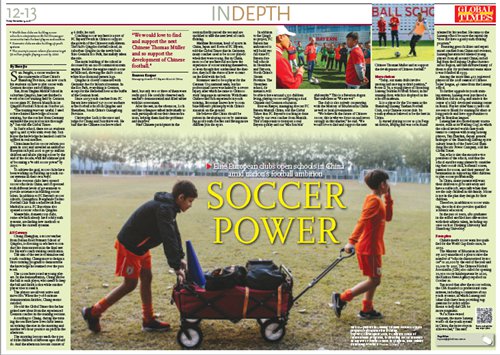IN-DEPTH / IN-DEPTH
Elite European clubs open schools in China amid nation’s soccer ambition
Soccer power
○ World-class clubs are building soccer schools in coperation with the Chinese government to train the best players and coaches
○ Domestic clubs are also building up youth systems
○ The country's soccer reform plan aims to get 50 million people playing soccer by 2020
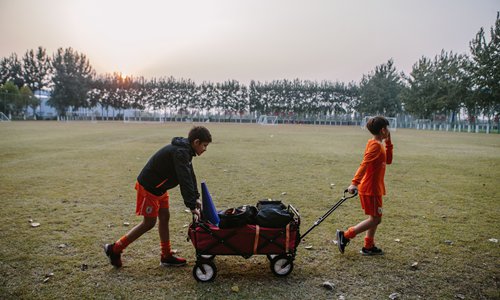
Two U11 players in Luneng Taishan Football School prepare to go home after training. Photo: Li Hao/ GT
Sun Pengfei, a soccer teacher in the countryside of East China's Shandong Province, can now coach his students on how to play soccer with German theories and techniques.
Sun, from Tinglan Middle School in suburban Qingdao, has just finished a week of soccer training held by German soccer giant FC Bayern Munich in its Qingdao Football School on October 26.
"The training was very useful. I used to have limited knowledge of soccer training, but the coaches from Germany explained the practical tactics thoroughly," Sun told the Global Times.
In Sun's school, there are 20 students aged 14 and 15 who train every day. Sun hopes the knowledge he learned could be applied in real matches.
China launched its soccer reform program in 2015 and unveiled an ambitious blueprint in April 2016 to get 50 million children and adults playing soccer by the end of the decade, with the ultimate goal of becoming a "world soccer power" by 2050.
To achieve the goal, soccer clubs have been working on building up youth soccer systems in their own ways.
More overseas clubs have opened soccer schools in China, and cooperated with different levels of government to provide assistance in building soccer talent. In addition to FC Bayern's soccer schools, Guangzhou Evergrande Taobao Football Club built a school with Real Madrid in 2012. FC Barcelona also opened a soccer school in Qingdao.
Meanwhile, domestic top clubs, some of which already have solid youth systems, are finding new methods to improve the current systems.
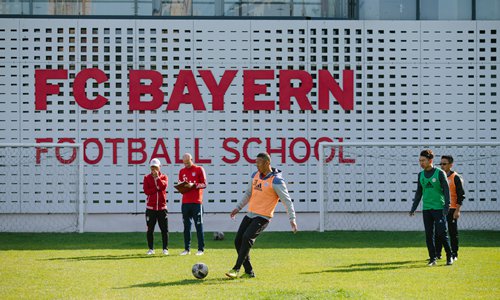
Christopher Loch, FC Bayern coach of international programs, is directing soccer teachers at Bayern's Football School in Qingdao, East China's Shandong Province. Photo: Li Hao/ GT
All German
Chang Zhengjian, a soccer teacher from Dexian Road Primary School of Qingdao, is directing 12 teachers to conduct his demonstration in the final test for Bayern's coach training certification.
The aim of the test is to simulate real youth coaching. Chang must to design a short training program to demonstrate the knowledge he retained over the past week.
The 12 teachers posed as young players. In the demonstration, Chang passes the ball to each player, who needs to keep the ball and finish a shot while another player tries to steal it.
The players are all very active and move fast. When the 7-or-8-minute demonstration finishes, Chang seems satisfied.
He told the Global Times that he has gained new ideas from the experienced German coaches in the training sessions.
According to Chang, during the training the teachers have a two-hour lesson on training theories in the morning and another two-hour practice on pitch in the afternoon.
The morning lessons teach the types of drills children of different ages should do. And the afternoon lessons consist of 4-6 drills, he said.
Coaching soccer teachers is a part of FC Bayern's work in China to support the growth of the Chinese youth system. The club's Qingdao football school, in suburban Qingdao in the newly built Sino-German Eco Park, has mainly taken the role.
The main building of the school is decorated by an out-of-commission train engine. Besides the engine stands a scarlet billboard, showing the club's iconic white-blue diamond-pattern logo.
Qingdao is closely connected with Germany due for historical reasons. In the Eco Park, everything is German, except for the Heineken beer at the buffet of the German hotel.
Since 2017, youth coaches from FC Bayern have trained 727 soccer teachers at the football schools in Qingdao and Shenzhen, South China's Guangdong Province.
Christopher Loch is the tutor and judge for Chang and Sun this week. He said that the Chinese coaches worked hard, but only two or three of them were really good. He carefully observed each teacher's demonstration and filled tables with his assessment.
After the test, in the afternoon, Loch and his colleagues talked individually to each participant about their demonstrations, helping them find the problems and improve.
Nine Chinese participants in the session finally passed the test and are qualified to take the next level of coach training.
Matthias Brosamer, head of sports in China, Japan and Korea of FC Bayern, told the Global Times that in Germany, many coaches used to be soccer players when they were young. But in China, most soccer teachers did not have the experience of soccer training themselves, so even though they understand the theories, they lack the sense of how to react on the field with the ball.
Brosamer used to be a player for the German U19 national team, but his professional career was halted by a severe injury, after which he came to China to study language in university. With fluent Chinese and rich experience in youth training, Brosamer knows how to combine Bayern's philosophy with China's situation on the ground.
He believes that China should be patient in developing soccer by maintaining good youth coaches and having more children join the sport.
In addition to the Qingdao project, FC Bayern has announced it will build two full-time FC Bayern football schools in Shenzhen and Taiyuan, North China's Shanxi Province. The Shenzhen school, for instance, will be able to have around 1,350 children living, playing soccer and getting a dual Chinese and German education.
Rouven Kasper, managing director FC Bayern Munich China, told the Global Times that FC Bayern's coaching is done "only by our own coaches from Munich. This is important to transport a real Bayern quality and our 'Mia San Mia' philosophy." This is a Bavarian slogan that translates as "We are we!"
The club is also actively cooperating with the Ministry of Education in China as well as local governments.
"We believe in the future of Chinese soccer, this is why we focus on and invest strongly in this market," he said. "We would love to find and support the next Chinese Thomas Müller and so support the development of Chinese football."
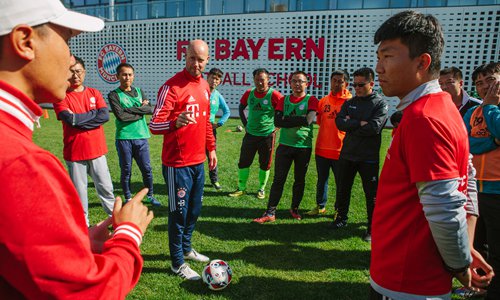
Christopher Loch, FC Bayern coach of international programs, is directing soccer teachers at Bayern's Football School in Qingdao, East China's Shandong Province. Photo: Li Hao/ GT
More choices
"Today, our main drills involve passing and moving to third position," wrote Li Ye, a young player at Shandong Luneng Taishan Football School, in his training diary, which is displayed in the school's museum.
Li is a player for the U11 team at the Shandong Luneng Taishan Football Club, a top Chinese soccer club. Its youth system is believed to be the best in China.
Li started playing soccer at 9 in Fengtai district, Beijing and was soon found talented by his teacher. He came to the Luneng school because the capital city "does not have a good youth training program."
Featuring great facilities and experienced coaches from China and overseas, Luneng has attracted talented young players from all around China, including from the Xinjiang Uyghur Autonomous Region, and has nurtured many of them to play for professional teams since it was founded in 1999.
Among the more than 400 registered players in the 2018 season of Chinese Super League, 46 came from the Luneng school.
To further upgrade its youth training system, Luneng even purchased a Brazilian club in 2014 and made it the center of a fully developed training center in Brazil. Players older than 13 years old are sent to Brazil for training for short or long periods and have opportunities to play in Brazilian leagues.
Luneng has also hosted many tournaments, such as its Weifang Cup, in which the school invited world-class youth teams to compete with young Luneng players, Tan Zhaohui, deputy general manager of the Shandong Luneng sports culture branch of the State Grid Shandong Electric Power Company, told the Global Times.
Tan, who is also the executive vice-president of the school, said that the school enrolls young players by considering their soccer skill, academic scores, passion for soccer, and their parents' determination in supporting their children to play soccer professionally.
In China, many parents still want their children to go to university and have a stable job, especially when they are the only children in the family. Soccer is not in the plan they design for their children.
Therefore, in addition to soccer training, the school also provides qualified academic education.
In the past 16 years, 280 graduates in the school enrolled into universities with their athletic talent, including top ones such as Zhejiang University and Shandong University.
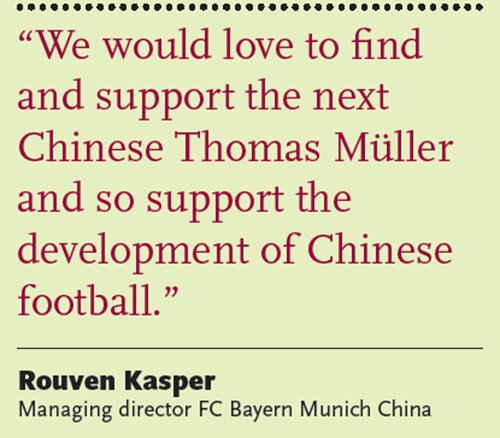
State plan
China's men's soccer team has qualified for the World Cup finals once, in 2002.
The Ministry of Education in February 2017 announced a plan to raise the number of "schools characterized by soccer" to 20,000 by the end of the year and 50,000 by 2025. The Chinese Football Association (CFA) also called for opening 10,000 soccer kindergartens by 2020, the Xinhua News Agency reported on October 10.
Tan noted that after the soccer reform, the CFA founded 12 professional committees, including a committee about youth systems, in which Luneng and other clubs have been providing suggestions for policy adjustments to help the CFA be more pragmatic.
"As a State-owned company, the more Luneng works on the youth system in China, the more responsible we feel," Tan said.
